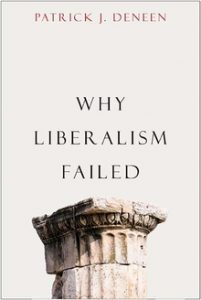Caldwell, ID. In late April, J.D. Vance minced no words in his condemnation of the “the globalization gravy train,” run on funding from what he and others have described as “Conservatism, Inc.” Frustrated by the discrepancy between the vibrancy of recent conservative efforts to conserve something beyond the “‘Washington consensus’ of neoliberalism and globalization” and the paucity of funding for such ventures, Vance raises a provocative question: “If a conservative idea falls in the woods, but there isn’t a libertarian dollar to fund it, does it even make a sound?”
While nearly all Americans envision themselves as being perpetual underdogs—even Tom Brady lapsed comfortably into underdog speeches before the 2019 Super Bowl—FPR can attest that the defense of decentralist politics and exploration of localist culture is not financially lucrative. As Jason Peters once wrote, FPR dreams about having a shoestring budget. There is freedom in less-than-shoestring budgets and it is also comforting that in being poor we meet one of Wendell Berry’s conditions for remaining in a movement. Nonetheless, there were still some cheers in FPR circles when Vance closed his article by calling for a “dagger thrust into the heart” of the neoliberal consensus that has long dominated the American Right.
The June 2020 Brass Spittoon brings together three people who were instrumental in the founding of FPR in 2009. Patrick Deneen is David A. Potenziani Memorial College Chair of Constitutional Studies at the University of Notre Dame and the author of Why Liberalism Failed, among other books. Jeremy Beer is Principal Partner at American Philanthropic and has written about the history of American philanthropy in The Philanthropic Revolution: An Alternative History of American Charity. Jeff Polet is professor of political science at Hope College and the former editor of Front Porch Republic.
Stewart: Postliberal conservatives have advocated for the patient building of small, coherent communities and national political institutions that can protect such communities. Where do you see the more promising developments so far?
Deneen: There is a range of visions for a post-liberal world, ranging from a revived localism to robust nationalism to a reimagined post-liberal trans-nationalism. Depending on the day of the week and whom I’m speaking with and against, I see attractions of each. I think a genuine post-liberalism will develop all three simultaneously, fostering the strengths of each that can in turn forestall their respective dangers, and recognizing that they are not mutually exclusive but potentially reinforcing. At the moment, the most politically ascendant is a muscular nationalism, expressed politically in the strength of nationalist populism, and intellectually in the “national conservatism” movement.
I disagree with most progressive liberals that the age of the nation is past, but agree with some of their concerns that an exclusive nationalism can deform our self-understanding as humans with memberships that are both smaller and larger than the nation. I would rather see us exploring ways that a properly-conceived nation can be supportive of localities—in part by limiting the destructive influence of anti-local commerce—while also being supportive of a properly-conceived internationalism that admires and preserves genuine cultural diversity and exchange. The alternative on offer is a globalism that destroys genuine localism by wedding internationalist capitalism and progressive cosmopolitanism, turning local cultures into globalized commodities and eviscerating local cultural distinction. A main purpose of the nation should be to limit this destructive globalism on behalf of more genuine local cultures and a more genuine multi-cultural internationalism.
Beer: The most promising development has been the widespread acceptance, on the Right, of this idea as a worthy goal. It’s certainly not unanimous, but the notion that this is a legitimate if not pressing task is far more common now than when Front Porch Republic was launched a decade ago. Back then, we were considered intellectually daring, even dangerous. Within a few years, the rhetorical battle was more nearly won than I ever imagined it would be.
We weren’t prepared for that. As thinkers, we had all the intellectual ammunition we needed. But we didn’t have an action plan. How was postliberal conservative localism (I’m going to call it PCL, because why not) going to be put into practice? Aside from general principles and a few illustrations drawn from history and contemporary life, we didn’t know.
It is not necessary, as the critics of localism often asserted and still assert, to be able to visualize or articulate in detail what postliberal, coherent, thick-bonded communities would look like or how they would operate. That’s impossible. But if we want such communities to be more than just a traditionalist boutique lifestyle choice, it is necessary to build, or take over, institutions that will resource, network, and encourage the growth of such communities in a variety of ways. This is where I would hope to see promising developments over the next decade. The very idea needs to come to be seen as non-marginal and non-crazy. It needs to take rural, suburban, and urban forms. And it needs to be applicable at different levels of practical intensity.
It seems probable to me that the communities we envision would need to emanate from parish, church, and synagogue life. Efforts at that level have hardly begun, so far as I know. I will say that there is an example here in Phoenix in the (Jewish) Lubavitch movement, which visibly lives a different and vibrant way of life in the midst of the city. I’m sure that scores of other examples could be adduced. But, as a vulgar, business-savvy donor might ask, how do we scale all of this? It’s a good question.
Polet: When FPR started we suggested that “hypermobility” was the great undiagnosed pathology of our time. While there is still some truth to this, the facts on the ground have changed in the intervening years. Americans are moving less now than they did ten years ago. More Americans, especially younger Americans, are “staying put.” The data bear out in conversations with my students, more and more of whom express a desire to return to the place of their birth once they graduate. Both the pandemic and the recent riots have demonstrated the fragility of our cities, and more young people are looking for stable, peaceful places where they can actually afford to live.
Interestingly, some of the biggest critics of this development are on the right, who complain that a lack of geographic mobility indicates a diminution of the economic dynamism that is the soul of capitalism. No more evidence is needed of the corruption of certain segments of modern “conservatism.” The economy is there to serve man, not man the economy. Rather than approaching the issue of mobility in terms of concrete human goods, these writers think in terms of abstractions. I have little faith in our national institutions to protect these communities. The predominant ethos there will remain one of exploitation, and I fear that current economic policies are accelerating that problem. The solution, as always, is for these communities to make themselves as strong and resilient as they can be, largely by pursuing fiscally sound policies and strengthening neighborhoods. Such self-reliance was once thought to be a virtue in this country.
Stewart: How should new institutions that are critical of the neoliberal consensus—or Vance’s “Conservatism, Inc.”—balance a concern for the “purity” of their funding with the necessity of building institutions that survive on something more than shoe-string budgets? How do we build broad consensus and sustainable funding models while at the same time challenging those aspects of conservatism that have proved to be so damaging?
Deneen: Money tends to follow and invest in success, and today, it’s increasingly clear to funders that the old political settlement is no longer viable. It’s less a matter of achieving “purity” of funding than setting forth a distinctive and viable vision for a post-liberal future, one that will attract visionaries of various walks of life—intellectuals, investors, political leaders—who will want to take part in fostering and launching a new and viable political alternative. While it is, and will remain the case, that many funders will remain locked in hoping to revive the old paradigm—particularly, an outsized amount of support for an exhausted and formulaic libertarianism—eventually, funders will grow tired of investing in a program with no future. If we build it, many will come.
Beer: To answer the first question first: this is a matter of prudent and virtuous leadership. Which is to say, there is no trick to it. It’s a matter of phronesis.
But allow me to take this opportunity to challenge an implicit premise behind the belly-aching heard in many circles, which is that it is outrageous for the man slipping a fiver to the piper to also request a tune. Quite obviously it is not. After having laid out a little hard-earned cash, piper-payers justifiably enjoy hearing their favorite songs. It is amazing that “rich people influence world more than poor people” is a news item capable of provoking shock and dismay on both the Left and Right.
I do not have much sympathy for nonprofit staffers who do not feel at liberty to publicly betray the mission that the donors to their organization had thought they were supporting. If you work for a Danish modern design firm, you were hired because of your knowledge of and passion for Danish modern, and a middle-aged couple slides a check across your desk in return for Danish modern—well, it really is a bit rich for you to arrive home from work one day, having had a conversion to arts and crafts, and start complaining bitterly to your friends that your firm’s commitment to Danish modern prevents you from telling potential customers that it is all a load of bollocks.
The problem, in short, isn’t that legacy fusionist conservative institutions promote legacy fusionist ideas and goals. After all, they told their piper-payers that was what they would do, and the piper-payers rightfully expect it. The problem is to reshape and re-form those expectations.
The triumph of Trump makes that easier than ever. The old orthodoxies have already cracked and crumbled. Then too, donors are more educable than you would think. In my experience, far fewer are motivated by naked self-interest than by core beliefs, principles, and passions. The donors I have known who are most articulate about the problems caused by economic financialization made their fortunes on Wall Street.
So we have a donor education challenge on our hands. The main thing is simply to take up the task. Let’s not think it can’t be done.
As donor sensibilities change, so will the policies and programs of legacy institutions. More surely, new institutions will pop up to minister to (and continue to shape) those sensibilities. Momentum is on our side. The American Conservative, where I serve as chairman of the board, has seen its revenue triple over the last six years—all because of donor support. Meanwhile, The New Republic and The Weekly Standard, once TAC’s most strident critics, have weakened or folded.
This is not to say that major donors, especially institutional donors, cannot suborn or silence organizations with their largesse. That happens all the time. But when it does, the problem lies with organizational leadership, not so much with the donor. Well-led organizations try to forestall such temptation by building institutions with broad donor bases.
One final point: The problem of the outsized-influence-of-the-wealthy, while it has been and always will be with us, becomes worse with growing wealth inequality. PCLs ought therefore to be seeking ways to constrain the amassing of great wealth, both individually and institutionally. Foundations, for example, have no natural right to live forever. They have no natural right for their corpuses not to be taxed. These are policy decisions that could and should be revisited. Even so, I would caution that there could be unintended effects, in terms of the power of the state vis-à-vis civil society only getting larger as a result. Any reform aimed at reducing wealth inequality and constraining the influence of larger donors should insist on reducing the scope and power of the centralized state as well.
Polet: This is an inordinately difficult question to answer, particularly as I find myself engaged in fundraising for a project dedicated to traditional conservative principles. I’ll start with a cliché: we don’t live in a perfect world. Anyone engaged in trying to make something good in this world has to be willing to get his hands dirty. It’s why gardening is a moral lesson. If there is money in the world that is “pure” I have yet to see it. Often our problem is that we work in binaries: money is either “pure” or its grubby. I think that’s a fairly adolescent way of seeing things, as evidence by some of my leftist colleagues who get upset any time the college raises money “from the wrong people.” I always ask: who are the right people, and where did they get their money from? Money becomes for them as extension of its possessor, rather than an entity in itself that implicates a way of being independent of who owns it. Still, it makes the world as we know it go round. We are, I take it on the authority of scripture, to be good stewards of it. We should not be blind to what it makes possible, or to the genuinely good human benefits it incurs. I don’t have a whole lot of patience with people who wring their hands about the corruptions of money while they cash their paychecks and manage the balances of their retirement accounts.
Likewise, I don’t have much patience for people who insist on “purity” in the fundraising process—whatever that might mean. I think it demonstrates a lack of sophistication in terms of how fundraising works. People fund things they believe in. You make your pitch, and you do it honestly, and you let the donor decide if it is something he wants to support. Undoubtedly there will be back and forth in the negotiation. Some donors will be more insistent on control than others. Your job as the fundraiser is to give a fair, accurate, and comprehensive accounting of what you want to accomplish and let the donor decide.
The problem with the question is that it focuses too narrowly on the recipient’s side. Many large-capital donors will look at proposals and think that the thing they are supporting is not perfect, but it is on the whole worthy of support. The donor might make a few recommendations, but are often fairly hands-off as regards details. Sometimes their recommendations are helpful changes.
The fact is that you are unlikely to raise money with any success from organizations or donors that don’t align with your mission. You’ll find people excited by what you are doing. There will often be a happy confluence.
What’s really behind this question, of course, is a kind of suspicion FPR has about the nature of money itself, the structure of our whole economic system, and whether it amounts to hypocrisy to benefit from it in any fashion. It’s the dilemma nicely captured by Anand Giridharadas in his Winners Take All: The Elite Charade of Changing the World. (I’ve written about it here.) I refer back to my earlier comments about us not living in a perfect world, and we have to engage the one we are actually in and not the one we wish we were in. In that sense, most sensible organizations will understand themselves to be salt and light. There remains the serious issue about corrupt elites, and how they operate in “Conservatism, Inc.” but the simple solution is not to take money from them—money they probably have no interest in giving to you anyway. You have to be willing to build slowly, painstakingly, and patiently. Make your case forthrightly and clearly. Someone somewhere will support that.
Vance’s main complaint is that donors will apply “pressure” to recipients. I don’t know the degree to which that is universally true. I suspect it isn’t. I also suspect it is easy to confuse “reaction” with “pressure.” The bottom line is that if a donor no longer likes what you’re doing, he’ll stop funding you. Conversely, if you don’t like things about the donor, you can stop asking him for money. I think Vance is over-complicating the nature of the relationship.
Stewart: Is there a conservative way to “end the globalization gravy train” through reform? The postliberal critiques are compelling and intellectually engaging because they address root problems, but then radical action can seem to be the necessary response. Can conservatives revolt against the status quo without forsaking the conservative insight that drastic upheaval causes far-reaching suffering?
Deneen: A paradox of conservatism is how to effect its ends in a time when “progressivism” has become the settlement. Those who are most interested in “conserving” the current system—i.e., those who lead its cultural institutions, media, universities, foundations, bureaucracy, professional and credentialing institutions—are the “revolutionaries,” while those who would seek to overturn this system are “conservatives.” One thing that is clear from recent elections is that it’s not the intellectuals who are leading the charge to upend this arrangement, but ordinary people. Whatever the “conservative” disposition of conservative intellectuals, the fact is, a radical change is in the offing not because of pamphlets and books, but a deep and profound well of discontent that is being expressed by “the people.” The “status quo” is changing, and the challenge for conservative intellectuals, it seems to me, is to guide and channel that popular discontent with analysis, direction, and viable policy. Perhaps most importantly, a different kind of conservatism—now aligned with the working class—must develop a very different leadership ethos than that which has been promoted by Conservatism, Inc. for the last half-century.
Beer: This is a great question that probably isn’t taken seriously enough by PCLs. Drastic upheaval is bad in and of itself. I think of Aleksandr Solzhenitsyn as the Soviet Union crumbled, and his warning that things were actually moving too fast, enriching oligarchs and leaving millions of ethnic Russians marooned in hostile countries outside Russia’s borders. That was a very conservative concern. So if the answer isn’t yes, we might as well pretend that it is.
Let me speak here to another concern that your question, and Vance’s provocative piece, both raise in my mind. As we engage in practical activities intended at eliminating the evils of globalization, and liberal individualism more broadly, it seems to me vitally important that we not pretend that postwar classical liberals and libertarians didn’t, and don’t, have some damn good points. They did and they do!—about regulatory capture, rent-seeking, crony capitalism, and the unintended consequences of centralized action more generally. Their analyses and critiques must be kept in mind, even if we want to take the risk—for it will be a risk—of using the machinery of the state to directly serve what we perceive to be the good of families and workers, as Vance suggests. It’s easy to make fun of Friedmanian anthropology, but that shouldn’t keep us from grappling with the more profound insights of 50 years of libertarian thought.
I appreciate Vance’s nod to Brent Bozell in his classic feud with Frank Meyer, but shouldn’t we have learned from the PC police and Social Justice Warriors that “behaving well” is not exactly something we all agree on? And shouldn’t we therefore be skeptical of the use of the state and its corporate minions to enforce its definition? Such skepticism needn’t be rooted in liberal fantasies about the possibility of governmental neutrality. I worry that Vance and others sympathetic to PCL haven’t thought deeply enough about this problem—even if, as I fully agree, they are right to contend that the promotion of virtue truly is a proper concern of the state.
This is where Burkean prudence comes in. This is where conservatives should tread lightly. Individual freedom is a good. So is constitutionalism. So is limited government. Let’s not get carried away by our postliberal rhetoric. These human goods simply need to be nested within the matrix of a better anthropology than liberalism offers, a matrix in which they are limited by other goods. Lord, if there is one thing we should learn from the last two months it is that the exercise of unrestrained governmental power is horrifying and destructive of the very goods—family and work—we profess to value. That lockdown promoters shout “individualism” as an epithet against anyone who dissents from the petty tyrants proclaiming who shall work and who shall not, and for how long, is good enough reason to want to reclaim the word as at least a limited good, I should think.
This is why I prefer postliberal conservative localism to postliberal conservative nationalism. The former attempts to incorporate the insights of libertarians about the dangers of statism and centralization with the anthropological insights of traditional, and principally Jewish and Christian, conservatives. At least it ought to do so. The latter seems to me simply to want to take over the levers of the existing state apparatus. If that’s the best we can do, it fills me with little enthusiasm.
Polet: The worst canard leveled against conservatism is that it’s a defense of the status quo. If that’s what it actually is, then the hell with it. Neither I nor any right-thinking person would have much interest in that. Conservatives have not, however, always made the Burkean case that people who make no preservation of their past will make no provision for the future. They have not confessed their mistakes (civil rights, anyone?) and can only with difficulty point to their successes. It is easier, after all, to demonstrate the benefits of “change” than the benefits of maintenance. Other than the Bar Jester most people would prefer a new truck to constantly fixing their old one. But it is in the latter that civilizations endure.
Burke realized that politics hinges not so much on reason, narrowly understood, but on the quality of the imagination. It is at that level that the battle must be engaged. The one-world inclusive globalizers, left and right, provide people with a vision of the world that seems so damned impressive. Perpetual peace. We’ll all get along. Everyone person gets to be exactly the kind of person he or she dreams of being, and gets celebrated in the process. Growth will be without end. Poverty and war will cease. It’s such a beautiful dream. Bringing heaven to earth is the dream of all reformers. It’s a lie, but one that resonates deep within human beings.
And so we must confront the lie with the truth. Here we have no abiding city. We see through a glass darkly. The forces of evil will often overwhelm the good. The best laid schemes gang aft agley. And so forth. Whatever else conservatism is—and this relates to the fundraising question—it is a hardheaded realism. The most fundamental aspect of this realism is that it can never be too full of its own virtue, which is the most annoying aspect of contemporary liberalism. It’s why conservatism needs religion, while liberalism is a religion.
Politics, Weber noted, is a slow drilling through hard boards. Incremental change allows you to correct course in a way a sudden veering will not. Gradualism allows time for persuasion and thus legitimacy to take root while revolution always operates on force. Heaven comes in through an apocalyptic war, after which time will be no more.
The conservative idea is not appealing. It is slow, painful, constantly changing its course, arduous, and difficult. The liberal dream is exciting and easy: just have the right sentiments and history is on your side. But one last battle and the dream is achieved. Stand on a street corner with a sign telling everyone you oppose injustice, and you get to believe yourself a good person. It is up to conservatives to figure out how to make their idea appealing, and the main way of doing this is by creating strong communities that are attractive to people, because they are hospitable and joyful.
How does this help us “end the globalization gravy train”? It doesn’t. That train will keep chugging until, as it must, it runs out of fuel (namely: fluid capital and labor and US military power). At that point, the humane solutions we form now will be what’s left. A conservative never, or at least seldom, will call for “radical action.” We call for prudent action whose appeal is in the way we live.
Stewart: Where are the fissures within Conservatism, Inc. that might provide opportunities for critics of globalization to begin working toward the foundational changes we need?
Deneen: Most fundamentally, a new conservatism rejects two parts of the “three-legged stool” that defined Conservatism, Inc. Gone are the “legs” of free-market ideology and a liberal interventionist foreign policy, while the “social conservative” leg will remain as the only part to be used in constructing a new stool. The social conservative constituency must be educated to understand that their goals will be better supported by a more national political economy oriented toward the common good of citizens, families, and communities, as well as a foreign policy in which America is less imperial, more defensive, and in which the burden of self-defense is more widely shared. I think this is where there might be the biggest opportunity and responsibility for the “intellectual” arm of post-liberal conservatism, building new institutions or transforming older institutions to serve a very different purpose and aim: a post-liberal, common-good conservatism.
Beer: Oh gosh, the fissures are now chasms. Conservatism, Inc., has never been more vulnerable to reform if not destruction. Except for the holdouts at The Bulwark, scads of thinkers and a healthy number of donors at almost all levels have become skeptical of globalization, individualism, and free-enterprise bromides in the last few years. It only takes courageous leadership to begin to forge new paths.
We are seeing just this in the variety of conservative approaches to the pandemic and the governmental and societal responses thereto. Conservatism Inc. institutions have mostly shown how out of touch they are with their purported constituents. Their reactions to the utter catastrophe unfolding before us have been comically feeble, failing completely to comprehend not the damage that will be done by the pandemic but by our elites’ reaction to it. It has taken scrappy dissenters associated with small institutions—like Aaron Ginn of the Lincoln Network—to speak up and speak out in a way that rank-and-file citizens of a conservative cast can resonate with.
So if you are looking for an “opportunity for critics of globalization to begin working toward the foundational changes we need,” this is it in more ways than one. We won’t get far if we minimize the importance of the lockdowns, as Vance unfortunately does in his article, and characterize them as a sideshow obscuring a more important debate. No: the lockdowns indicate in crystal-clear fashion just how important the fundamental debate Vance wishes to have is. They have illuminated the depth of our crisis with respect to questions of class and globalization and economic financialization and so on—Vance’s legitimate concerns—while raising issues that postliberal reformers have not yet come to grips with. The issue of hyper–risk aversion—which is perhaps the most important social problem we face. The insistence that we defer to technocrats and “experts.” The profound abandonment of self-government as an ideal. The willingness to use fear and risk inflation to exert social control. The near total lack of functioning checks and balances at the state and local levels. The fusion of society and state. The special kind of spiritual desiccation felt by and promoted by our elites.
I will wager that any organization or person that isn’t deeply troubled if not totally pissed off by the lockdowns will not be regarded as trustworthy by the middle- and working-class families that our new postliberal conservatism wishes to represent. And rightly so. Just talk to the working classes. Hit their bars. They are furious at the lockdowns. If we want to set ourselves up as their tribunes, how can we belittle them?
As an example of courageous leadership, I will happily point to Rusty Reno at First Things. Far from descending into crankishness, as has been asserted, Reno has displayed the kind of manly spiritedness that is precisely what our pathologically risk-averse world is lacking (Ross Douthat’s new book on decadence illustrates this fact at length). That Reno (ill-considered Tweets aside) has been taken to task even by postliberal conservatives only shows just how much some of them share in the cultural sensibilities of our age, in particular in the belief that we can engineer our way out of any crisis—so long as the working classes can be kept quiet (and made to pay for it).
Polet: I suppose I should take a moment here to engage Vance’s argument directly. I think it has both substantial strengths and significant weaknesses. I’ll start with the latter. First, I don’t think that “Conservatism, Inc.” is as coordinated or monolithic as he suggests. Each foundation, each donor, has its own mission and engagements, and sometimes these operate in conjunction with each other (they do coordinate when such coordinations are called for), sometimes by happenstance, and sometimes unwittingly. The foundations are, after all, large bureaucratic organizations that have difficulty maintaining internal consistency, much less a broad coordination with other foundations. “Looking at the boards of our big conservative institutions” is a borderline ad hominem that doesn’t do much to enlighten us as to how these foundations really act, or how much control the board actually exercises. What’s true of the reformicons is, minimally, true of Conservatism, Inc.
Likewise, I’m not persuaded by his view of China. I don’t doubt that China is, as regards the pandemic and economic life in general, a bad actor. Neither do I have much use for the arguments conservatives keep making, against all evidence, that China’s economy will cause it to liberalize its politics. Our current policies toward China are the results of decades, even centuries, of interaction. Undoubtedly it is true that globalists will look the other way at human rights abuses when it is in their interest to do so. I find it risible that so many on the left but also the right were willing to give China a free pass on the virus and so willingly buy into that government’s obvious propaganda. But my opposition to globalization doesn’t mean I believe that the US shouldn’t have a China policy, nor that it shouldn’t be a realistic one.
That said, Vance is exactly right when he says things such as “Our economy is based on consumption, debt, financialization, and sloth. There is no end to the lockdown that returns our country to health or prosperity if it ignores these facts.” The lockdown revealed all sorts of breakdowns in the supply chains, in weaknesses in production, and in the capitalization of small businesses. And yet our government responded by issuing nearly $3 trillion of debt-driven cash that went primarily to the consumption side of our economy. And I have little doubt that this is largely because of the twisted world our elites live in. They will fight the pandemic by wearing masks as they walk around Central Park and ordering take-out from their local bistro, but if you had asked them to pick up a shovel or a hammer and do actual work I guarantee you they would have been the ones protesting in state capitols. The pandemic has revealed in so many ways the continued corruption of America’s elites, and few writers understand the costs of this corruption with quite the same clarity or authority that Vance does.









1 comment
Dan Grubbs
I won’t claim to fully grasp all that these minds have shared here. However, I would have appreciated more analysis of the failure of the individual person in all of this. Humans, since expulsion from Eden, have exhibited a terrible self-centric mindset that motivates our behaviors. We are the broken artifact here. Institutions of all forms are broken because they are populated with broken actors, regardless of persuasion. Pick your metaphor to illustrate the failure of a part causes the whole to be deficient. I would have liked to see more discussion on this idea here. Maybe it’s just an academic exercise because it’s a given that humans are broken, no matter how self righteous we my believe ourselves or some icon to be. I don’t see our brokenness as academic at all. It is the root of our problems. And if any of us claim to desire localism, we should also claim to understand that a healthy locality is only possible if the constituents maintain an others-centric mindset. In my opinion, I don’t need access to mind-boggling funding in order to help my neighbor erect a fence or ask for help to erect my fence — something that goes much further in community building than some state or foundation program. Berry’s understanding for being a good neighbor takes us a long way to others-centric thinking. But the fact that it is so hard to find being consistently and without hesitation being displayed is an indicator that we are broken and no financial utopia will ever change that.
Comments are closed.